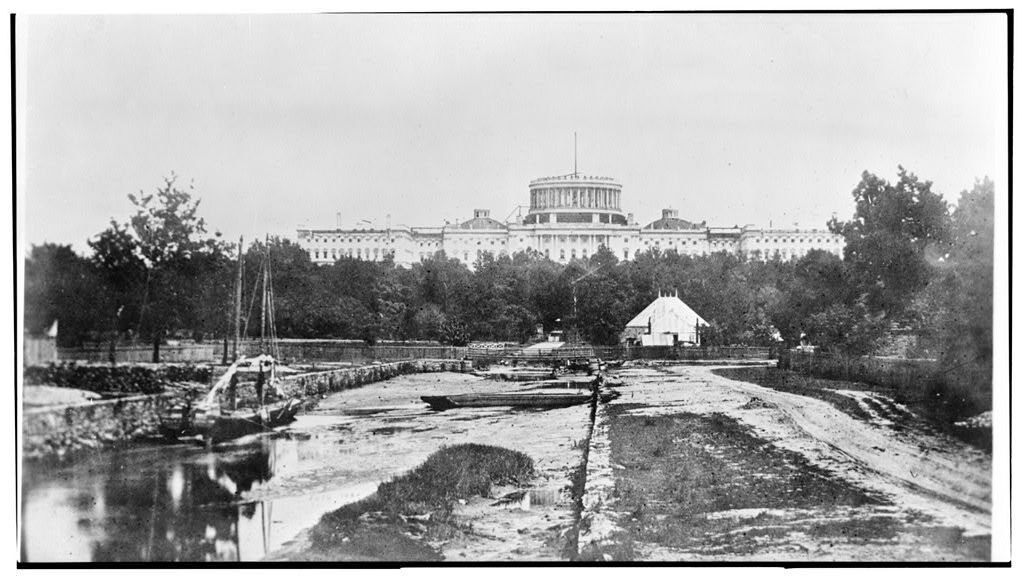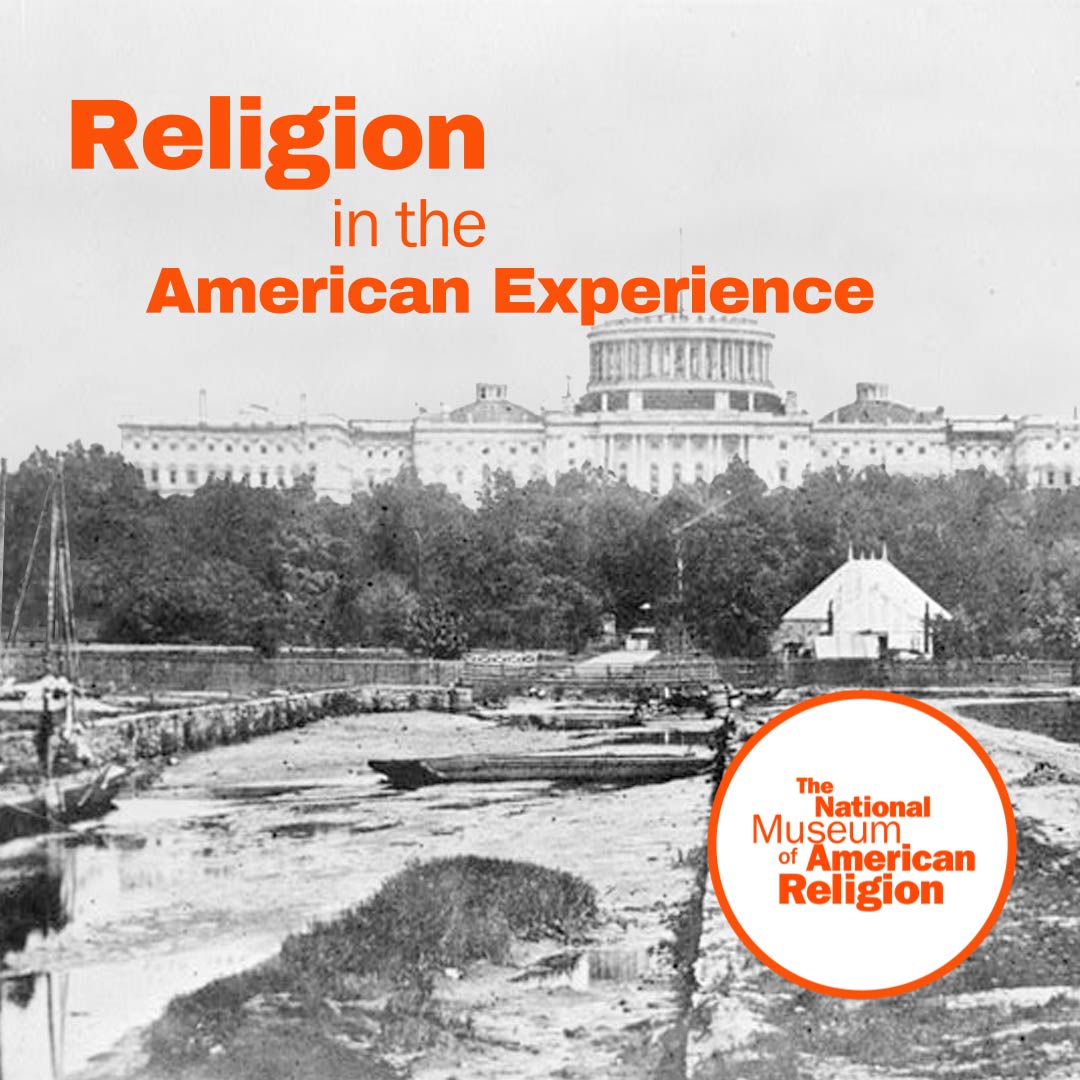
15.1K
Downloads
71
Episodes
Learning from scholars and every day Americans about what religion has done to America and what America has done to religion, helping all of us better comprehend and perpetuate the American experiment in self-government, including what is perhaps its greatest innovation and the essence of the American project: religious freedom as defined by the Constitution’s Article VI and First Amendment religion clauses.
Episodes
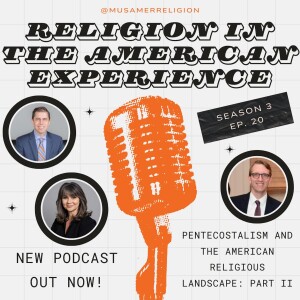
Tuesday Dec 31, 2024
Pentecostalism and the American Religious Landscape: Part II
Tuesday Dec 31, 2024
Tuesday Dec 31, 2024
As part of our multi-episode series about Pentecostalism – a relatively unknown and perhaps misunderstood, fast growing, and very large part of Christianity, we will be talking with Darrin Rodgers and Ruthie Oberg from the Flower Pentecostal Heritage Center in Springfield, Missouri.
The Flower Pentecostal Heritage Center (FPHC) is the largest Pentecostal archives in the world. Located in the National Office of the Assemblies of God USA, the FPHC collects printed materials, oral histories, artifacts, photographs, and memorabilia documenting the Assemblies of God and the broader Pentecostal and charismatic movements, spanning the globe. The FPHC has become an important hub for Pentecostal history and research, preserving and promoting Pentecostal testimonies and identity so that future generations can know the works of God. Countless church leaders, scholars, students, people in the pew, and other researchers have used its collections.
Darrin Rodgers is the director of the Center and has an M.A. in Theological Studies from Assemblies of God Theological Seminary and a J.D. from the University of North Dakota School of Law. He came to the FPHC from Fuller Theological Seminary, where he served at the David du Plessis Archive and the McAlister Library. He has authored Northern Harvest, a history of Pentecostalism in North Dakota, and numerous articles in books and journals. His research interests include Pentecostal origins, ethnic aspects of Pentecostalism's development, and the intersection of Christianity and culture.
Ruthie Oberg is an events speaker with the Center and is an ordained Assemblies of God minister, having served in senior and associate pastoral roles for 25 years. Ruthie speaks at national conferences, local churches, has produced a daily radio program in the Omaha market. Her articles have appeared in the Pentecostal Evangel, Enrichment, Influence, and Assemblies of God Heritage, and she is a regular contributor to “This week in AG History” for AG News. She is also a past chair of the Library and Research Committee of the Society for Pentecostal Studies.
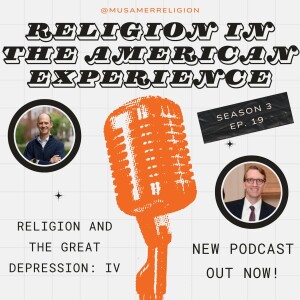
Wednesday Dec 18, 2024
Religion and the Great Depression: Part IV
Wednesday Dec 18, 2024
Wednesday Dec 18, 2024
Lodged firmly in the American psyche and a bedrock part of American and personal family histories, is the Great Depression. Beginning with the stock market crash in October of 1929 - the market losing 50% of its value in weeks - and lasting more than a decade, it was the worst calamity to hit the United States since the Civil War. At its worst one out of every four workers was unemployed. Farms went under with their former inhabitants leaving their homes seeking shelter, food, and work; poverty and want were everywhere. The emotional toll on millions was severe. Americans and America was traumatized and transformed.
For us the question is, in what ways did religion – one of the greatest and most ubiquitous forces in American history – react to the Great Depression? Understanding this will help us comprehend religion’s role in the American project, equipping us to be perpetuate and perfect it into the 21st century.
As part of our multi-episode series about religion in the Great Depression, Dr. Jonathan Ebel will share the story of New Deal government camps for migrant workers in California and what he calls “the religion of reform.”
Dr. Jonathan Ebel is a professor of religion at the University of Illinois Urbana-Champaign. He received his PhD from the University of Chicago and has B.S. from Harvard. Professor Ebel's research program involves religion and war, religion and violence, and lay theologies of economic hardship all within the American context. He is the author of several books including From Dust They Came: Government Camps and the Religion of Reform in New Deal California, G.I. Messiahs: Soldiering, War, and American Civil Religion, Faith in the Fight: Religion and the American Soldier in the Great War, and is the co-editor of From Jeremiad to Jihad: Religion, Violence, and America. He is currently at work on a religious history of American warfare in five weapons.
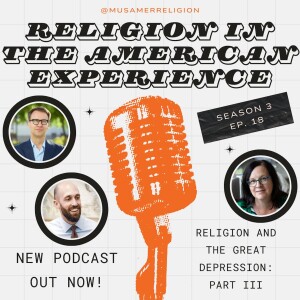
Tuesday Dec 10, 2024
Religion and the Great Depression: Part III
Tuesday Dec 10, 2024
Tuesday Dec 10, 2024
Lodged firmly in the American psyche and a bedrock part of American and personal family histories, is the Great Depression. Beginning with the stock market crash in October of 1929 - the market losing 50% of its value in weeks - and lasting more than a decade, it was the worst calamity to hit the United States since the Civil War. At its worst one out of every four workers was unemployed. Farms went under with their former inhabitants leaving their homes seeking shelter, food, and work; poverty and want were everywhere. The emotional toll on millions was severe. Americans and America was traumatized and transformed.
For us the question is, in what ways did religion – one of the greatest and most ubiquitous forces in American history – react to the Great Depression? Understanding this will help us comprehend religion’s role in the American project, equipping us to be perpetuate and perfect it more successfully into the 21st century.
As part of our multi-episode series about religion in the Great Depression, Dr. Lisa Tait, Dr. Ben Park, and Dr. Matt Bowman are here to tell the story of how The Church of Jesus Christ of Latter-day Saints responded to and was changed by the Great Depression.
Dr. Lisa Olsen Tait works in the Church History Department of The Church of Jesus Christ of Latter-day Saints and is a historian and writer specializing in women’s history. Dr. Tait received a PhD in American Literature and Women’s Studies at the University of Houston. Her dissertation and several subsequent publications are on Latter-day Saint women’s response to the gendered and generational crises of the 1890s. Dr. Tait’s long-term project is a biography of Susa Young Gates, one of Brigham Young’s daughters.
Dr. Benjamin Park is an associate professor of history at Same Houston State University where he studies the intersections between religion, culture, and politics in America, mostly during the eighteenth and nineteenth centuries and often within a broader Atlantic context. He received a PhD in history from the University of Cambridge. He has written several books including American Nationalisms: Conceiving Union in the Age of Revolutions, 1783-1833, Kingdom of Nauvoo: The Rise and Fall of a Religious Empire on the American Frontier, and American Zion: A New History of Mormonism. Dr. Park currently serves as an associate editor of Mormon Studies Review.
Dr. Matthew Bowman is the Howard W. Hunter Chair of Mormon Studies, with a joint appointment in history and religion, at Claremont Graduate University. He received a PhD in American History from Georgetown University. Dr. Bowman is a specialist in American religious history, with particular interests in Mormonism, new religious movements, and the development of the concept of “religion” in the United States. He is the author or co-editor of The Mormon People: The Making of an American Faith, Women and Mormonism: Historical and Contemporary Perspectives, and Christian: The Politics of a Word in America. Dr. Bowman is currently serving as co-editor of the University of Illinois Press series Introductions to Mormon Thought.
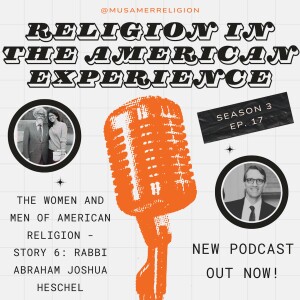
Monday Dec 02, 2024
The Women and Men of American Religion. Story 6: Abraham Joshua Heschel
Monday Dec 02, 2024
Monday Dec 02, 2024
In this sub-series “The Women and Men of American Religion” we explore the women and men who, fueled in large part by their religion, have made significant and broad contributions to the American tapestry. This helps immensely in understanding better what religion has done to America and what America has done to religion. Previous episodes include Billy Graham, Elizabeth Seton, Joseph Smith, and Fannie Lou Hamer.
Today we will get to know the life and times of Abraham Joshua Heschel, perhaps best known by the American public as the rabbi who walked alongside Rev. Martin Luther King in the famous protest march in the spring of 1965. One renown scholar of American religion wrote this: “On college and university campuses, at Christian seminaries as well as Jewish rabbinical assemblies, at colloquies on race relations and in the corridors of power, he spoke on the sensitive and difficult problems of the day in the best tradition of the Western conscience and of its biblical roots.”
To help us do this, we have with us Susannah Heschel, the Eli M. Black Distinguished Professor of Jewish Studies at Dartmouth College and chair of the Jewish Studies Program and a faculty member of the Religion Department.
Dr. Heschel received her A.B. at Trinity College and Ph.D. at the University of Pennsylvania. Her scholarship focuses on Jewish and Protestant thought during the 19th and 20th centuries, including the history of biblical scholarship, Jewish scholarship on Islam, and the history of anti-Semitism. Her numerous publications include Abraham Geiger and the Jewish Jesus, which won a National Jewish Book Award, The Aryan Jesus: Christian Theologians and the Bible in Nazi Germany. Heschel has been a visiting professor at the Universities of Frankfurt and Cape Town as well as Princeton, and she is the recipient of numerous grants, including from the Ford Foundation, Carnegie Foundation, and a yearlong Rockefeller fellowship at the National Humanities Center. She has received many honors, including the Mendelssohn Prize of the Leo Baeck Institute, and five honorary doctorates from universities in the United States, Canada, Switzerland, and Germany. Currently she is a Guggenheim Fellow and is writing a book on the history of European Jewish scholarship on Islam. She is an elected member of the American Society for the Study of Religion and the American Academy for Jewish Research.
And, importantly, Susannah is the daughter of our subject - Abraham Joshua Heschel.
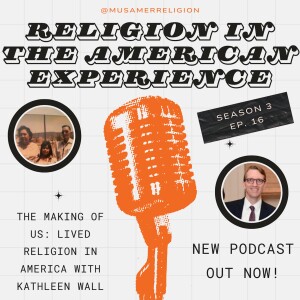
Thursday Oct 24, 2024
The Making of US: Lived Religion in America with Kathleen Wall
Thursday Oct 24, 2024
Thursday Oct 24, 2024
Another episode in the subseries "The Making of US: Lived Religion in America", our effort to document everyday Americans' religious histories. Today Kathleen Wall of Jemez Pueblo, New Mexico shares with us her own deep, rich personal religious history.
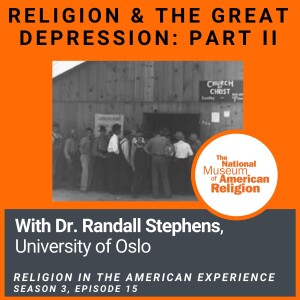
Thursday Sep 26, 2024
Religion and the Great Depression: Part II
Thursday Sep 26, 2024
Thursday Sep 26, 2024
Lodged firmly in the American psyche and a bedrock part of American history, is the Great Depression. Beginning with the stock market crash in October of 1929 - the market lost 50% of its value in weeks - and lasting a decade, it was the worst calamity to hit the United States since the Civil War. Unemployment soared, many lost hope, hunger stalked individuals and families, farms went under, long bread lines formed, people up and left their homes for a better place, and poverty skyrocketed.
For us, the question is, in what ways did religion – one of the greatest and most ubiquitous forces in our history – react to the Great Depression? Understanding this will help us better comprehend and perpetuate the American project, including the religion clauses in the U.S. Constitution: “Congress shall make no longer law respecting an establishment of religion, or prohibit the free exercise thereof.”
As part of our multi-episode series about religion in the Great Depression, Dr. Randall Stephens is joining us to talk about the Protestant response to the Dust Bowl.
Dr. Randall J. Stephens is professor of American and British Studies at the University of Oslo. He previously taught at Northumbria University (Newcastle upon Tyne) and Eastern Nazarene College (Quincy, Massachusetts). He is a historian of religion, conservatism, the South, environmentalism, and popular culture and is the author of several books including The Fire Spreads: Holiness and Pentecostalism in the American South and The Devil’s Music: How Christians Inspired, Condemned, and Embraced Rock ’n’ Roll , (look for a “Religion in the American Experience” episode focused on this fascinating topic!) and was editor of Recent Themes in American Religious History. Specific to our discussion today, he is the author of an article that came out in the October 2023 issue of Church History: Studies in Christianity and Culture: “The Dust Bowl, the Depression, and American Protestant Responses to Environmental Devastation.” In 2011-12, he was a Fulbright Roving Scholar in Norway. Dr. Stephens received his BA in History at Mid America Nazarene College and his PhD in American History from the University of Florida.
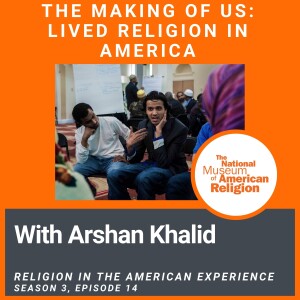
Wednesday Aug 28, 2024
The Making of US: Lived Religion in America with Arshan Khalid
Wednesday Aug 28, 2024
Wednesday Aug 28, 2024
Another episode in the subseries "The Making of US: Lived Religion in America", our effort to document everyday Americans' religious histories. Today Arshan Khalid of Washington, D.C. shares with us his own deep, rich personal religious history.
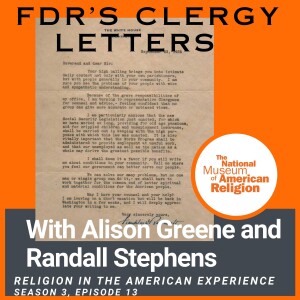
Thursday Jul 25, 2024
FDR's Clergy Letters
Thursday Jul 25, 2024
Thursday Jul 25, 2024
Lodged firmly in the American psyche and a bedrock part of American history, is the Great Depression. Beginning with the stock market crash in October of 1929 - the market lost 50% of its value in weeks - and lasting a decade, it was the worst calamity to hit the United States since the Civil War. Unemployment soared, farms went under, long bread lines formed, people up and left their homes for a better place, and poverty skyrocketed. The emotional toll on millions was just as severe.
For us, the question is, in what ways did religion – one of the greatest and most ubiquitous forces in our history – react to the Great Depression? Understanding this will help us better comprehend and perpetuate the American project, including the religion clauses in the U.S. Constitution: "no religious Test shall ever be required as a Qualification to any Office or public Trust under the United States" and “Congress shall make no law respecting an establishment of religion, or prohibit the free exercise thereof.”
As part of our multi-episode series about religion in the Great Depression, Dr. Alison Greene and Dr. Randall Stephens are joining us to talk about the story of FDR’s clergy letters.
Dr. Alison Collis Greene is Associate Professor of American Religious History at Candler School of Theology at Emory University and is an affiliated faculty member in the Department of History at Emory College of Arts and Sciences. She teaches United States religious history, with interests in American religions as they relate to politics, wealth and poverty, race and ethnicity, the environment, and the modern rural South. She is author of No Depression in Heaven: The Great Depression, the New Deal, and the Transformation of Religion in the Delta, as well as a number of essays and articles on modern United States religious history in both scholarly and popular outlets. Dr. Greene is also on the editorial board of the Journal of Southern Religion.
Dr. Randall J. Stephens is professor of American and British Studies at the University of Oslo. He is a historian of religion, conservatism, the South, environmentalism, and popular culture and is the author of several books including The Fire Spreads: Holiness and Pentecostalism in the American South and The Devil's Music: How Christians Inspired, Condemned, and Embraced Rock 'n' Roll, and was editor of Recent Themes in American Religious History. Specific to our discussion today, he is the author of an article that came out in the October 2023 issue of Church History: Studies in Christianity and Culture: “The Dust Bowl, the Depression, and American Protestant Responses to Environmental Devastation.”
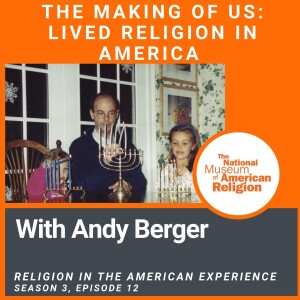
Tuesday Jun 25, 2024
The Making of US: Lived Religion in America with Andy Berger
Tuesday Jun 25, 2024
Tuesday Jun 25, 2024
Another episode in the subseries "The Making of US: Lived Religion in America", our effort to document everyday Americans' religious histories. Today Andy Berger of Cincinnati, Ohio shares with us his own deep and rich personal religious history.
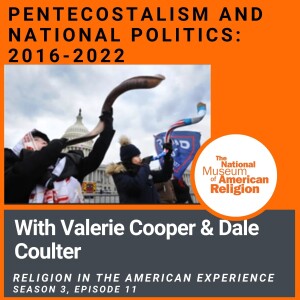
Tuesday May 28, 2024
Pentecostalism and National Politics 2016-2022
Tuesday May 28, 2024
Tuesday May 28, 2024
As part of our multi-episode series about Pentecostalism – a relatively unknown and perhaps misunderstood, fast growing, and very large part of Christianity, we will be exploring Pentecostalism and its support of Donald Trump between 2016 and 2022.
Valerie Cooper is associate professor of religion and society and black church studies at Duke Divinity School. Using historical and theological methodologies, her wide-ranging scholarship examines issues of religion, race, politics, and popular culture. She has published essays on African American evangelicals (particularly in Pentecostalism and the Holiness Movement), on African Americans’ use of the Bible, and with political scientist Corwin Smidt, co-authored an essay on the roles of religion and race in the 2008 election of President Barack Obama. Her article on “Black Theology” is forthcoming in the Oxford Handbook of Political Theology.
Her book, Word, Like Fire: Maria Stewart, the Bible, and the Rights of African Americans, analyzes the role of biblical hermeneutics in the thought of Maria Stewart, a pioneering 19th-century African American woman theologian and political speaker. Cooper is currently working on Segregated Sundays, a book evaluating the successes and failures of the racial reconciliation efforts of Christian congregations and ministries from the 1990s to the present.
Dale Coulter is an ordained minister in the Church of God (Cleveland, TN) and professor of historical theology at Pentecostal Theological Seminary. He studied the Middle Ages while completing his DPhil at the University of Oxford. Much of his work has centered on the twelfth century abbey of St. Victor, having published a monograph on Richard of St. Victor. His most recent work is a collection of essays he co-edited titled, The Spirit, the Affections, and the Christian Tradition. He has authored a popular work on holiness and occasionally writes at the online platform for the journal First Things, which is published by the Institute for Religion and Public Life. He has also written articles for outlets such as The Washington Post, Christianity Today, The Stream, Keryx, and Seed Bed. He is a past president of the Society for Pentecostal Studies. Dale has also served as co-editor of PNEUMA: The Journal of the Society for Pentecostal Studies (2010-2015) and currently serves on its editorial board. He is also involved in ecumenical discussions between Orthodox and Pentecostals as well as a participating member of Evangelicals and Catholics Together.
